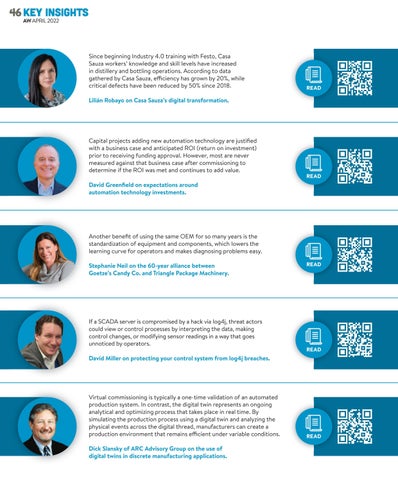46 KEY INSIGHTS AW APRIL 2022
Since beginning Industry 4.0 training with Festo, Casa Sauza workers’ knowledge and skill levels have increased in distillery and bottling operations. According to data gathered by Casa Sauza, efficiency has grown by 20%, while critical defects have been reduced by 50% since 2018. Lilián Robayo on Casa Sauza’s digital transformation.
Capital projects adding new automation technology are justified with a business case and anticipated ROI (return on investment) prior to receiving funding approval. However, most are never measured against that business case after commissioning to determine if the ROI was met and continues to add value. David Greenfield on expectations around automation technology investments.
Another benefit of using the same OEM for so many years is the standardization of equipment and components, which lowers the learning curve for operators and makes diagnosing problems easy. Stephanie Neil on the 60-year alliance between Goetze’s Candy Co. and Triangle Package Machinery.
If a SCADA server is compromised by a hack via log4j, threat actors could view or control processes by interpreting the data, making control changes, or modifying sensor readings in a way that goes unnoticed by operators. David Miller on protecting your control system from log4j breaches.
Virtual commissioning is typically a one-time validation of an automated production system. In contrast, the digital twin represents an ongoing analytical and optimizing process that takes place in real time. By simulating the production process using a digital twin and analyzing the physical events across the digital thread, manufacturers can create a production environment that remains efficient under variable conditions. Dick Slansky of ARC Advisory Group on the use of digital twins in discrete manufacturing applications.
2204_KeyInsights.indd 46
3/29/22 9:56 AM




